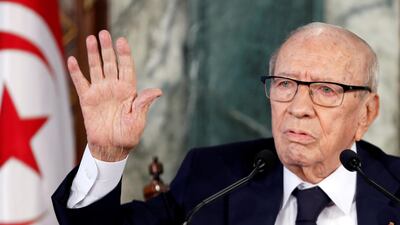Tunisia's president has escalated a dispute with the prime minister by calling for changes to the constitution to give the presidency more power.
Tunisia adopted a new constitution in 2014, three years after the uprising that removed the long-serving autocratic president Zine El Abidine Ben Ali, that significantly reduced the previously extensive power of the presidency and gave the prime minister and parliament a much bigger role.
"The president has no major functions and executive power is in the hands of the prime minister," President Beji Caid Essebsi said in a televised speech to mark Tunisia's independence day on Wednesday.
"It would be better to think about amending some chapters of the constitution," he said. The president controls defence and foreign policy under the new charter – both in reality relatively minor policy areas.
Mr Caid Essebsi, a former parliamentary speaker under Ben Ali, had been the dominant figure in the North African country since his election in 2014. But he has lost influence since Prime Minister Youssef Chahed took office in 2016.
Tensions have been building up between the two men and escalated last year when the president called on Mr Chahed to resign. But the prime minister instead unveiled a new cabinet last November together with the moderate Islamist Ennahda party.
Now, with a parliamentary election due in October and a presidential vote starting in November, Mr Caid Essebsi is calling for an overhaul of the constitution.The parliamentary race is expected to be closely fought by Ennahda, Mr Chahed's more secular Tahya Tounes party and the Nidaa Tounes party led by Hafedh Caid Essebsi, the president's son. No one has yet declared their candidacy for the presidency.
Jouhar Ben Mubarak, a law professor, told Reuters that Mr Caid Essebsi would be unable to push through amendments any time soon as this would require approval by a constitutional court which still needs to be set up.
Ali Larayedh, an Ennahda official, also said the time was not right to amend the constitution before the elections, state news agency TAP said.
The political wrangling over the past months has alarmed donors who have kept Tunisia afloat with loans granted in exchange for a promise of reforms such as cutting a bloated public service.
The president's son has accused Mr Chahed of failing to tackle high inflation, unemployment and other problems.
Tunisia has been hailed as the only democratic success to come out of the Arab uprisings of 2011, because Ben Ali was toppled without triggering the violent upheaval seen in Syria and Libya.
But since then, nine cabinets have failed to resolve the country's economic problems, which include high inflation and unemployment, and impatience is rising among lenders such as the International Monetary Fund.

